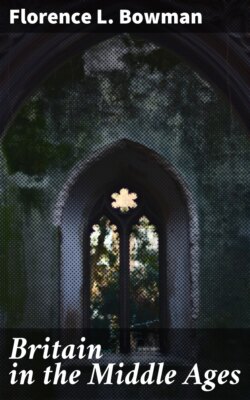Читать книгу Britain in the Middle Ages - Florence L. Bowman - Страница 4
На сайте Литреса книга снята с продажи.
CHAPTER II
ОглавлениеTable of Contents
THE ROMANS
The best soldiers in the world were the Romans, who came from the great city of Rome, far away in Italy. Everybody had heard of their mighty deeds, for they had conquered nearly every land except Britain, and to them Britain seemed to be in the farthest corner of the world, just on the edge, a land, no doubt, of dragons and strange wild people. Now the Romans had heard that there was meat and corn in plenty in the land, that there were tin mines, and tin was very useful for mixing with copper to make armour. So they invaded Britain.
The great Roman army moved very slowly through the land, for there were few roads. Sometimes the soldiers had to cut down trees to make their way through the forests, sometimes they had to cross the dismal fenlands, sometimes to make a bridge over a flooded river, or to wade knee-deep through the swamps. As they marched, they had to fight with the Britons.
The Scots had heard of their coming and were safely hiding in their fastnesses when the Romans reached the Borderland. Then the Romans built a great wall from sea to sea between the two countries, Scotland and Britain, a wall that must have taken several years to build even if they had thousands of men to build it. It was made of the finest stone, which they seem to have carried many miles across the country. It was nine feet wide and eighteen feet high and the turrets were placed so near together that the sentinels could call to one another and so send a message quickly. Below the wall, on the enemy's side, they dug a deep ditch, often having to make it through the hard limestone rock. Every mile, they built a spacious fort for the soldiers to rest in, well defended and quite close to the wall. Every four miles, there was a station, sometimes a small town, surrounded by a wide wall, too, where perhaps the chief officers lived. From station to station, from east to west, ran the great road, for the traffic of the army. Up to the gates of the stations, too, came the new Roman roads from the south, for the army sometimes had to call for help from other places and needed food and many things from the south. It must have been a stern duty to keep watch in the bleak winter months, and the soldiers seem to have had few comforts. The remains of this great wall still lie from Wallsend to the west coast.
At the cross-roads, by the great rivers, the Romans built their towns and camps all over Britain, just like those they had known in Italy. Every town was surrounded by a great wall, whence the soldiers could keep a look-out for the enemy, and nobody could enter the place except through the gates between sunrise and sunset. Outside the town, they sometimes built an amphitheatre, where games and wild beast fights were held on holidays.
The houses of the chief officers were built like those in sunny Italy. The most interesting room in the house was the bath-room, with a large tank, like a swimming bath, in the floor and a furnace to keep a good supply of hot water. The floor was paved with beautiful coloured tiles and scenes were painted on the walls. This room was very important, because the Roman often received his guests there and sometimes invited them to share in the ceremony of the bath. The garden was often lovely, there were orchards and smooth lawns and closely clipped hedges of box and yew, sometimes cut into fantastic shapes like birds and beasts. There were brightly coloured flowers, which had been brought from Italy—geraniums, roses and orchids. Then, there was the summer house, whose walls were made of tall trees growing close together, and inside were couches and rugs and sometimes even a little lake in the centre, where jellies and fruits were to be seen floating in beautiful dishes, to keep them cool and fresh, as though the summer in Britain were very hot.
There was much work to be done. The Roman officer had to visit the camps, driving in his chariot or carried in his litter by his slaves. He had to see that the road-making went on well, for the Romans made fine roads through Britain from north to south, to the east and to the west. He had to look after the building of the factories, where the wool was made into cloth and dyed in the famous purple dye, and if he lived in the south west, the tin mines in Cornwall had to be supervised. Sometimes, he had even to take the long and difficult journey to Rome. The Britons looked on at this new life with great fear and wonder, and soon they learned to make better houses, to raise better crops and to live in the towns.
When, three hundred years later, all the Romans were called to their own land to protect it against a strong enemy, the Britons were worse off than ever they had been before. Not only did the Scots come over the wall to burn and steal, but a new and a stronger enemy came over the seas from Denmark and Germany to seize the treasure that the Romans had left unguarded.
